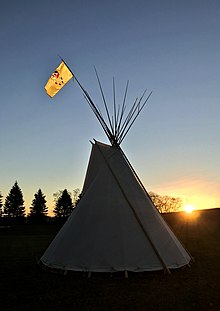 | |
| Regions with significant populations | |
|---|---|
| United States (Michigan) | |
| Languages | |
| English, Ojibwe (Ottawa) | |
| Religion | |
| Midewiwin, Native American Church, Catholicism, Methodism, and Protestantism | |
| Related ethnic groups | |
| Other Ojibwe and Odawa, Potawatomi and other Algonquian peoples |
The Mackinac Bands of Chippewa and Ottawa Indians is a state recognized tribe of Ojibwe and Odawa Native Americans, based in the state of Michigan. The tribe is headquartered in St. Ignace, Mackinac County and has around 4,000 enrolled members. Today most tribal members live in Mackinac, Chippewa, Emmet, Cheboygan, and Presque Isle counties, however many tribal members are also located throughout the state of Michigan and the United States.
History[edit]

The Mackinac Bands of Chippewa and Ottawa Indians are descendants of Anishinaabe people who migrated from somewhere in the Northeast to the Great Lakes area[1] (now known as Michigan) sometime around 1500 CE, and the remnants of the Michinemackinawgo who previously inhabited Mackinac Island and the Straits area.[2] Members of the Thunder Bay Band of Michigan were also absorbed by the Mackinac Bands in the mid 1800s. The Odawa, Ojibwa, and Potawatomi people were closely related and affiliated as the Council of Three Fires.
The Mackinac Bands is one of the oldest and largest historical groups in Michigan. It occupied territory around Mackinac and traded with French colonists at their post set up at St. Ignace, in what later became Michigan, United States. They later also traded with British and United States traders, after the border was changed and as a result of wars among those powers.
The Mackinac Bands of Chippewa and Ottawa comprises Units 11 through 17 of the former Northern Michigan Ottawa Association, a confederation formed in 1948 to politically address the needs of the Anishinaabe peoples in Michigan. Since that time several bands have gained federal recognition, sometimes through legislation. The Sault Ste. Marie Tribe of Chippewa Indians was federally recognized in 1972. In 1979 its Tribal Council passed a resolution to accept the Mackinac Bands as members, and nearly doubled its enrollment as a result. The people who are members of the Mackinac Bands of Chippewa and Ottawa Indians withdrew to pursue federal recognition independently. The Mackinac Bands have interests and issues in common outside the Sault tribe, and they have been petitioning for federal recognition since 1998. The Mackinac Bands claims status as a successor apparent to the signatory tribe of the Treaty of Washington (1836) and Treaty of Washington (1855) with the United States of America. Most tribal members live in Emmet, Cheboygan, Presque Isle, and Mackinac counties. As of 2012 the Mackinac Bands of Chippewa and Ottawa Indians has been recognized as a State Historic Tribe by the state of Michigan.[3] In that capacity, it has received block grants to help it provide for community services to its people.
Notable tribal members[edit]
- Frank Dufina, early American golf professional
References[edit]
- ^ Calloway, Colin G. (2006). One Vast Winter Count: The Native American West Before Lewis and Clark (New ed.). University of Nebraska Press. p. 56. ISBN 978-0803264656.
- ^ Pritzker, Barry (2000). A Native American Encyclopedia: History, Culture, and Peoples. Oxford University Press. p. 406. ISBN 978-0195138771.
anishinabe.
- ^ Michigan Department of Civil Rights; Michigan Legal Services. Michigan Indian Directory (PDF) (2016–2017 ed.). Michigan Department of Civil Rights. p. 6.



